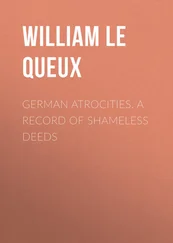William Le Queux - Whither Thou Goest
Здесь есть возможность читать онлайн «William Le Queux - Whither Thou Goest» — ознакомительный отрывок электронной книги совершенно бесплатно, а после прочтения отрывка купить полную версию. В некоторых случаях можно слушать аудио, скачать через торрент в формате fb2 и присутствует краткое содержание. Жанр: foreign_prose, на английском языке. Описание произведения, (предисловие) а так же отзывы посетителей доступны на портале библиотеки ЛибКат.
- Название:Whither Thou Goest
- Автор:
- Жанр:
- Год:неизвестен
- ISBN:нет данных
- Рейтинг книги:5 / 5. Голосов: 1
-
Избранное:Добавить в избранное
- Отзывы:
-
Ваша оценка:
- 100
- 1
- 2
- 3
- 4
- 5
Whither Thou Goest: краткое содержание, описание и аннотация
Предлагаем к чтению аннотацию, описание, краткое содержание или предисловие (зависит от того, что написал сам автор книги «Whither Thou Goest»). Если вы не нашли необходимую информацию о книге — напишите в комментариях, мы постараемся отыскать её.
Whither Thou Goest — читать онлайн ознакомительный отрывок
Ниже представлен текст книги, разбитый по страницам. Система сохранения места последней прочитанной страницы, позволяет с удобством читать онлайн бесплатно книгу «Whither Thou Goest», без необходимости каждый раз заново искать на чём Вы остановились. Поставьте закладку, и сможете в любой момент перейти на страницу, на которой закончили чтение.
Интервал:
Закладка:
The General ruminated. He was the most insular of insular Britons. He hated all persons of other nations. It annoyed him that his nephew should be in the company of this long-haired foreigner.
“It is time this old country of ours closed its doors to this kind of gentry,” he said, in a decided voice, as he drained his glass of champagne.
Lady Mary smiled. How very much he resembled her own father. The same obstinate views, with, at bottom, the same kind heart.
The next morning, the little party of three saw the young diplomatist off at the station. Guy held his sweetheart very close when he gave her his farewell kiss.
“I say, dearest, you will write every day, won’t you?”
And Isobel nodded her dark head.
“Of course, dear, pages and pages.”
“And I say, that good-looking cousin of yours we met last night! He has never made love to you, has he?”
Isobel laughed gaily. “Dear old Maurice! Why he used to carry me about when I was a baby. And dad and I are awfully fond of him. He is just a big, dear elder brother.”
“I don’t quite know that I like a big, dear elder brother, when he happens to be a cousin,” replied Guy, a little grimly.
Isobel smiled her most delightful smile.
“Oh, Guy, I believe you are really jealous, and of poor old Maurice, of all people. My dear boy, he only lives for his work; he is a barrister, you know, and is made up of parchment.”
“He looked very human when he shook hands with you,” remarked Guy drily. “I fancy there’s not much parchment where you are concerned.”
“Silly boy, to even think of such things. And what about me, when you get to Madrid? I am told the Spanish ladies are very fascinating. What chance shall I have against them.”
So she turned the tables on Guy, and he had to defend himself against disloyalty in the future.
Then the train steamed off. With a hearty handshake from the General, with the kisses of his sweetheart and sister warm upon his lips and his cheeks, Guy Rossett set out on his journey to Spain. Little could he foresee the adventures that were in store for him.
Chapter Four
“And you think mischief is brewing, eh?”
The speaker was Maurice Farquhar. The man he addressed was Andres Moreno, the black-browed Spaniard who had dined with him on the previous evening at the restaurant where they had met Guy Rossett and his party.
Maurice, a member of the junior bar, with a daily increasing practice, rented a charming suite of rooms in one of the most cloistered courts of the Temple. Certainly, this suite was on the top floor, and it was a stiff climb up those stairs. But Maurice was young and healthy, and the ascent of those few steep stairs did not trouble him in the least.
Apart from his own special legal business, which absorbed his best faculties, he was a man of many interests. During the lean years, when he had waited for briefs, he had supplemented his modest patrimony by journalism. He became a somewhat well-known figure in Fleet Street, specialising more or less upon foreign politics.
Then, when the briefs began to flow in, he had gradually dropped journalism. Now and again, at the earnest request of a persistent editor, he would write an article or a letter on some burning question, in which he could display his particular knowledge of affairs.
In those old journalistic days, happy, careless days, when a dinner at the old “Cheshire Cheese” was accounted something of a luxury, when he never entered the portals of the Ritz or Carlton, save as the guest of some rich friend or relation, he had struck up a great comradeship with Andres Moreno, son of a Spanish father and an English mother, an adroit and clever journalist, who could turn his hand to anything.
Nothing came amiss to Moreno; he was the handy man of journalism. He could write a most flamboyant description of a fashionable bazaar. He could, in a sufficiently well-paid article, penetrate the subtle schemes of European monarchs and statesmen.
His knowledge of London and every other foreign capital was illuminating. He knew every prominent detective, he enjoyed the acquaintance of not a few members of the criminal classes. He was hail-fellow-well-met with staunch monarchists and avowed anarchists. But it was always difficult with this man, who had friends in so many camps, to discover what were his real opinions.
Maurice who, perhaps, knew him better than anybody, on the mental side, always declared that he had no fixed opinions.
“When you are with the good old-fashioned Tory,” he had said once to him laughingly, “you are all for King and Church and State and good Government. When you are with the anarchist, your sympathies go with the poor devils who have got nothing, and want to blow up everybody, in the hopes of getting a bit out of the wreck.”
And Moreno, in the same jocular spirit, had admitted there was a certain element of truth in the description.
“I am so infernally sympathetic, you know, Farquhar. I am like a straw blown by the wind. Any man who can talk to me earnestly for five minutes makes me see eye to eye with him. When I have left him, when the magnetism of his presence is removed, the cold fit succeeds, and I see with the eye of Andres Moreno. On the whole, I think I may say I am on the side of law and order.”
And Farquhar had replied in the same half-jocular vein. “Better stick on that side, old man. Otherwise they will end by taking from you even that little which you have.”
Since those days of early friendship, the two men had prospered exceedingly. Moreno was a very highly paid journalist. Farquhar was one of the rising members of the junior bar.
The young barrister repeated his question.
“And you think mischief is brewing, eh?” Moreno raised himself from what appeared to be a deep reverie. It was a peculiarity of the man that suddenly he would relapse into deep meditation, and for the moment seem oblivious of what was going on around him. Then, in a flash, his keen intellect would assert itself, and he would pick up, in a very easy fashion the dropped threads of the previous conversation.
“Very serious mischief, old man,” he said, in his deep, rather husky tones. He spoke English perfectly, by the way, without the slightest trace of foreign accent. As a matter of fact, he had been born and bred in the country of his mother.
“Is it a great secret?” questioned Farquhar.
Moreno looked at him kindly. He was very greatly attached to this quiet Englishman, who had taken him by the hand in those early days when some of the brethren of the pen had regarded him as an outsider, and shown their dislike very plainly.
“It is to everybody else, but not to you, my old and tried friend. I can trust you not to suck another man’s brains. Besides, you are out of the business now. Yes, there are great things going on, in Madrid, Barcelona and Seville. There are also great things going on in a little corner in London, I can assure you.”
Farquhar lifted his eyebrows, but he made no comment. Moreno would talk when it pleased him.
The Spaniard laughed softly, and leaned back in his chair. He was a man of deep and subtle humour, and was continually smiling at the ironies and incongruities of life.
“I am going to astonish you now, my good Maurice. To-morrow night I am going to be inducted as a member of an anarchist society in Soho.”
Farquhar, disturbed in his well-balanced mind, gave a violent start.
“Are you mad, Andres? Have you any idea of what you will commit yourself to?”
Moreno shrugged his broad shoulders indifferently.
“I shall know, and size it all up the day after to-morrow; I am a soldier of fortune, my friend. I am an enterprising journalist – anything for sensation, anything for ‘copy.’ I shall put my anarchist friends to good use.”
Читать дальшеИнтервал:
Закладка:
Похожие книги на «Whither Thou Goest»
Представляем Вашему вниманию похожие книги на «Whither Thou Goest» списком для выбора. Мы отобрали схожую по названию и смыслу литературу в надежде предоставить читателям больше вариантов отыскать новые, интересные, ещё непрочитанные произведения.
Обсуждение, отзывы о книге «Whither Thou Goest» и просто собственные мнения читателей. Оставьте ваши комментарии, напишите, что Вы думаете о произведении, его смысле или главных героях. Укажите что конкретно понравилось, а что нет, и почему Вы так считаете.












